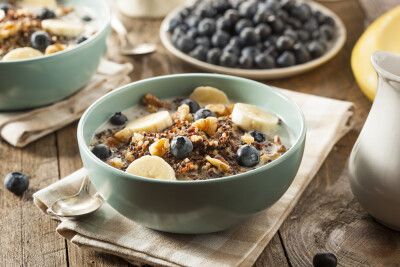World’s largest nutrition research project finds one diet does not fit all
Individual responses to food are unique, even between identical twins, according to new research by King's College London and Massachusetts General Hospital, presented Monday at the American Society for Nutrition’s annual conference.
As part of the PREDICT 1 study, the first of two studies under this project, researchers looked at data from 1,100 U.K. and U.S. adults, 60 percent of which were twins. Over two weeks, participants had regular glucose monitoring of blood sugar, insulin, triglycerides, and other blood markers in response to a combination of standardized and freely chosen meals.
The results reveal a wide variation in blood responses to the same meals, whether they contained carbohydrates or fat. For example, some participants had rapid and prolonged increases in blood sugar and insulin, which are linked to weight gain and diabetes. Others had fat levels that peaked and lingered in the bloodstream hours after a meal, raising the risk of developing heart disease.
This large variation is only partly explained by genetic factors—less than 50 percent for glucose, less than 30 percent for insulin, and less than 20 percent for triglycerides—and there is only a weak correlation between an individual's responses to fat and carbohydrates. Identical twins who share all their genes and most of their environment often had different responses to identical foods. The study also finds that identical twins shared just 37 percent of their gut microbes, only slightly higher than the 35 percent shared between two unrelated individuals.
The proportions of nutrients such as fat, proteins, and carbohydrates listed on food labels explain less than 40 percent of the differences between individuals' nutritional responses to meals with similar amounts of calories. There are also large differences in responses to the same meals depending on the time of day they are eaten.
The results, researchers say, suggest that personal differences in metabolism due to factors such as the gut microbiome, meal timing, and exercise are just as important as the nutritional composition of foods, supporting the idea that simple nutritional labeling is insufficient for assessing food.
This groundbreaking nutrition research project was born out of the Twins U.K. Study, a 25-year investigation of health and lifestyle in 14,000 twins led by Tim Spector, professor of genetic epidemiology at King's College London. For the study, Spector started a for-profit company, ZOE, with the hope of creating an app that would offer users personalized nutrition advice about how to eat and how their bodies might respond to foods.
“The sheer scale and detail of our scientific project is such that for the first time we can explore tremendously rich nutrition data at the level of an individual,” Spector said in a statement. “Our results surprisingly show that we are all different in our response to such a basic input as food. It was a real shock to see that even identical twins have such different responses."
The findings demonstrate that old-fashioned, one-size-fits-all dietary guidelines are too simplistic and that a personalized approach to nutrition is likely to provide better long-term health benefits.
The research team is also announcing a major expansion of its work in collaboration with scientists at Stanford and Tufts Universities. The next phase, aptly named PREDICT 2, is already underway and will recruit more than a thousand volunteers across the U.S. who want to understand their own personal responses to food and contribute to cutting-edge nutritional science by taking part at home.
According to Andrew Chan, MD, MPH, professor of medicine at Harvard Medical School and a gastroenterologist at Massachusetts General Hospital said it is reassuring that our genetic makeup only partially explains how our bodies respond to food.
“This underscores that our metabolism is not fixed—we have the power to change it,” he said. “One exciting avenue is to tailor our diets to the bacteria in our gut that helps us metabolize nutrients."




















SHARE